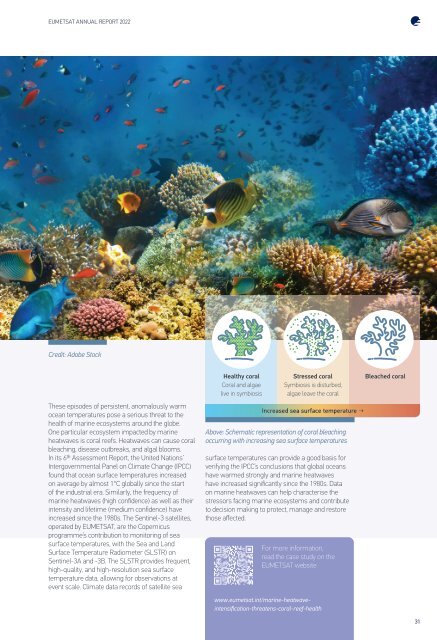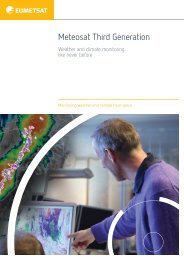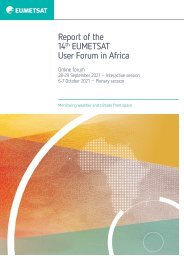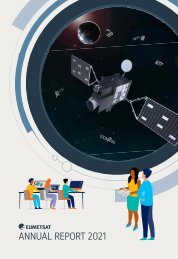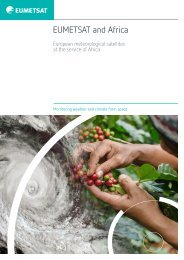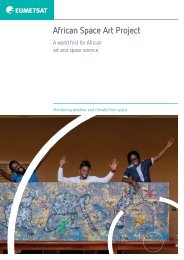EUMETSAT Annual Report 2022
Create successful ePaper yourself
Turn your PDF publications into a flip-book with our unique Google optimized e-Paper software.
<strong>EUMETSAT</strong> ANNUAL REPORT <strong>2022</strong><br />
Credit: Adobe Stock<br />
These episodes of persistent, anomalously warm<br />
ocean temperatures pose a serious threat to the<br />
health of marine ecosystems around the globe.<br />
One particular ecosystem impacted by marine<br />
heatwaves is coral reefs. Heatwaves can cause coral<br />
bleaching, disease outbreaks, and algal blooms.<br />
In its 6th Assessment <strong>Report</strong>, the United Nations’<br />
Intergovernmental Panel on Climate Change (IPCC)<br />
found that ocean surface temperatures increased<br />
on average by almost 1°C globally since the start<br />
of the industrial era. Similarly, the frequency of<br />
marine heatwaves (high confidence) as well as their<br />
intensity and lifetime (medium confidence) have<br />
increased since the 1980s. The Sentinel-3 satellites,<br />
operated by <strong>EUMETSAT</strong>, are the Copernicus<br />
programme’s contribution to monitoring of sea<br />
surface temperatures, with the Sea and Land<br />
Surface Temperature Radiometer (SLSTR) on<br />
Sentinel-3A and -3B. The SLSTR provides frequent,<br />
high-quality, and high-resolution sea surface<br />
temperature data, allowing for observations at<br />
event scale. Climate data records of satellite sea<br />
Healthy coral<br />
Coral and algae<br />
live in symbiosis<br />
Stressed coral<br />
Symbiosis is disturbed,<br />
algae leave the coral<br />
Increased sea surface temperature ⇢<br />
Above: Schematic representation of coral bleaching<br />
occurring with increasing sea surface temperatures<br />
surface temperatures can provide a good basis for<br />
verifying the IPCC’s conclusions that global oceans<br />
have warmed strongly and marine heatwaves<br />
have increased significantly since the 1980s. Data<br />
on marine heatwaves can help characterise the<br />
stressors facing marine ecosystems and contribute<br />
to decision making to protect, manage and restore<br />
those affected.<br />
For more information,<br />
read the case study on the<br />
<strong>EUMETSAT</strong> website<br />
Bleached coral<br />
www.eumetsat.int/marine-heatwaveintensification-threatens-coral-reef-health<br />
31


